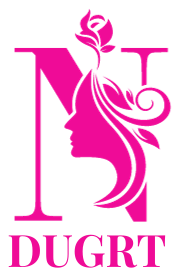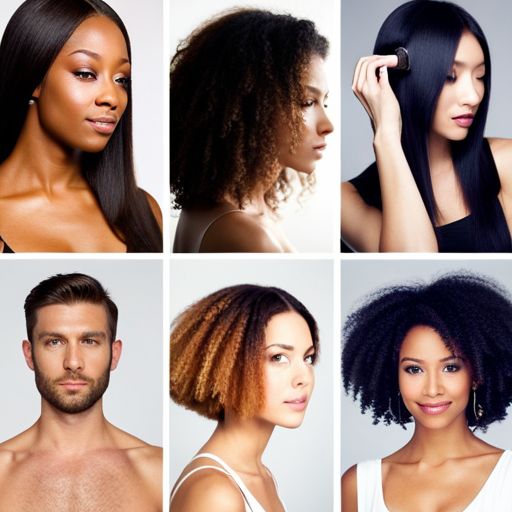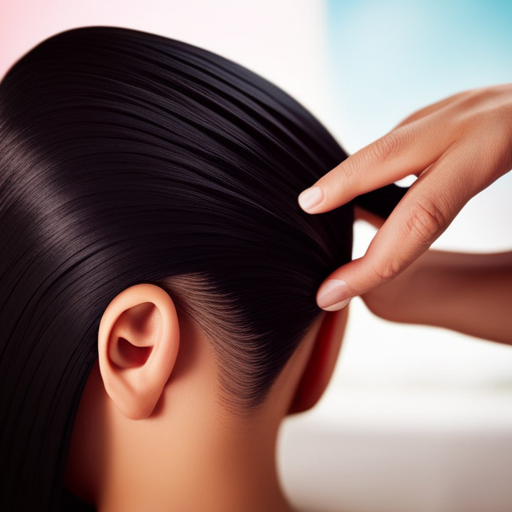The Role of Vitamins and Supplements in Hair Health

Did you know that the average person loses 50-100 strands of hair per day?
Understanding the role of vitamins and supplements in hair health is crucial in maintaining a strong and vibrant mane.
From essential vitamins to mineral supplements and antioxidants, this article explores the impact of various nutrients on hair care.
By evaluating the benefits of biotin, herbal supplements, and balanced nutrition, readers will gain valuable insights into promoting healthy and lustrous hair.
Understanding Hair Structure
One key determinant of hair health is a comprehensive understanding of the intricate structure of the hair follicle. The hair follicle is a complex structure responsible for hair growth and maintenance. It consists of multiple layers, including the innermost medulla, the cortex, and the outermost cuticle. The cortex, which contains the hair’s protein structure, is crucial for determining the strength and elasticity of the hair. This protein structure is essential for maintaining the overall health and appearance of the hair.
Another vital aspect of the hair follicle is its moisture balance. The cuticle, which acts as a protective layer, plays a crucial role in regulating the entry and retention of moisture within the hair shaft. Maintaining an optimal moisture balance is essential for preventing issues such as dryness, brittleness, and breakage. Understanding the intricate balance of moisture within the hair follicle is paramount in achieving healthy and lustrous hair.
Essential Vitamins for Hair Health
In order to promote healthy hair growth and overall hair health, it is essential to understand the role of specific vitamins.
Vitamin D plays a crucial role in hair follicle cycling.
Biotin, a B vitamin, is known for its role in maintaining healthy hair.
Additionally, iron is important for the transportation of oxygen to the hair follicles, supporting their overall health and growth.
Vitamin D for Hair
Vitamin D plays a crucial role in maintaining the overall health and strength of hair. Its benefits extend to promoting hair growth, supporting hair health, and aiding in hair maintenance. Adequate vitamin D intake is essential for overall hair nutrition.
Vitamin D supplementation can be beneficial for individuals with a deficiency, as it directly impacts hair growth and hair care. Research suggests that low levels of vitamin D are associated with hair loss and poor hair health. Therefore, ensuring sufficient vitamin D levels is vital for maintaining healthy and strong hair.
Incorporating vitamin D-rich foods into the diet, getting regular sun exposure, and considering supplements when necessary can all contribute to optimal hair health.
Biotin and Hair
Biotin, essential for hair health, plays a vital role in supporting the overall strength and quality of hair, in addition to promoting hair growth and maintenance. Biotin benefits include its ability to improve the infrastructure of keratin, the protein that makes up hair, skin, and nails. Furthermore, it helps in the stimulation of hair follicles, leading to increased hair growth and preventing hair from becoming brittle and weak. A deficiency in biotin can result in hair loss and thinning, making it crucial to ensure an adequate intake of this vitamin. The table below summarizes the key benefits of biotin for hair health.
| Biotin Benefits |
|---|
| Supports hair strength and quality |
| Promotes hair growth |
| Prevents hair from becoming brittle and weak |
| Stimulates hair follicles |
| Helps improve infrastructure of keratin |
Understanding the importance of biotin for hair health, it is also essential to explore the role of iron in maintaining healthy hair.
Iron and Hair
Iron is crucial for maintaining healthy hair as it plays a key role in facilitating the proper growth and strength of hair follicles. Iron absorption is essential for the transportation of oxygen to the hair roots, aiding in the production of protein and supporting overall hair health.
Iron deficiency has been linked to hair loss, making it important for individuals to ensure they have an adequate intake of this mineral. When the body lacks iron, it directs its limited oxygen supply to vital organs, leaving the hair follicles deprived and potentially leading to weakened, brittle hair that is more prone to breakage.
Incorporating iron-rich foods or supplements into one’s diet can help prevent hair loss and support healthy hair growth, contributing to overall hair health and vitality.
Impact of Mineral Supplements
Minerals play a crucial role in the health of our hair. Their deficiency can lead to various hair-related issues. The benefits of mineral supplements in promoting hair growth and strength are well-documented. This makes them an important consideration for maintaining healthy hair. Understanding the recommended intake of essential minerals can provide valuable insights into supporting overall hair health.
Mineral Deficiency and Hair
Mineral deficiencies can significantly impact hair health, making it essential to consider the potential impact of mineral supplements. Minerals such as iron, zinc, and selenium play crucial roles in promoting healthy hair growth.
Iron deficiency, for example, can lead to hair loss as it is essential for carrying oxygen to the hair follicles. Similarly, zinc deficiency has been linked to hair thinning and slow hair growth. Selenium, on the other hand, helps maintain a healthy scalp by promoting proper circulation and reducing inflammation.
When mineral deficiencies are identified as contributing factors to hair issues, incorporating mineral supplements into a well-balanced diet can help address these deficiencies and support overall hair health. However, it’s important to consult a healthcare professional before starting any new supplement regimen to ensure it is safe and appropriate for individual needs.
Benefits of Mineral Supplements
The inclusion of mineral supplements in a well-balanced diet can significantly impact hair health by addressing potential deficiencies and supporting healthy hair growth. Some of the key benefits of mineral supplements for hair health include:
-
Zinc benefits, hair growth: Zinc plays a crucial role in hair tissue growth and repair. It helps to keep the oil glands around the follicles working properly.
-
Copper role, hair health: Copper is essential for maintaining the natural color of the hair and supporting the health of the scalp.
-
Iron support, hair strength: Iron helps red blood cells carry oxygen to hair follicles, promoting healthy growth and preventing hair loss.
-
Selenium protection, scalp health: Selenium aids in maintaining a healthy scalp, preventing dandruff and promoting overall hair health.
Transitioning into the subsequent section about ‘recommended mineral intake’, it is important to carefully consider the appropriate dosage of these minerals to maximize their benefits for hair health.
Recommended Mineral Intake
Transitioning from the benefits of mineral supplements, it is imperative to consider the recommended intake of these essential elements to optimize their impact on hair health.
Adequate mineral absorption is crucial for maintaining healthy hair. It is recommended to obtain minerals from a balanced diet that includes dietary sources such as leafy greens, nuts, seeds, whole grains, and lean protein. These sources provide essential minerals like iron, zinc, and selenium, which play a vital role in promoting hair growth and strength.
However, in cases where dietary intake may be insufficient, mineral supplements can be beneficial. Consultation with a healthcare professional is advisable to determine the appropriate dosage, as excessive intake of certain minerals can have adverse effects on hair and overall health.
Finding the right balance of mineral intake through a combination of dietary sources and supplements can significantly impact hair health.
Role of Antioxidants in Hair Care
Antioxidants play a crucial role in promoting healthy hair by protecting the scalp and hair follicles from oxidative stress. They offer numerous benefits for hair care, including:
- Combatting Free Radicals: Antioxidants help neutralize free radicals that can damage hair cells and lead to hair thinning or loss.
- Promoting Hair Growth: By reducing oxidative stress, antioxidants support healthy hair growth and help maintain the strength of hair follicles.
- Improving Scalp Health: Antioxidants contribute to a healthier scalp by minimizing inflammation and enhancing blood circulation, which can improve the overall condition of the hair.
- Preserving Hair Pigmentation: Certain antioxidants, such as vitamin E and selenium, can help maintain the natural pigmentation of hair and prevent premature graying.
These benefits highlight the significant role of antioxidants in maintaining optimal hair health.
As essential as antioxidants are, they work even more effectively in combination with other vital nutrients.
Transitioning into the subsequent section, it’s important to also explore the significance of omega-3 fatty acids in supporting hair health.
Importance of Omega-3 Fatty Acids
One essential nutrient that plays a significant role in promoting hair health is omega-3 fatty acids. Omega-3 benefits for hair nourishment are widely recognized in the medical and scientific communities. These essential fatty acids are not produced by the body and must be obtained from dietary sources such as fish, flaxseeds, and walnuts. Omega-3 fatty acids help nourish hair follicles, promoting healthy and strong hair growth. They also support scalp health by reducing inflammation and preventing dryness, which can contribute to hair loss. Furthermore, omega-3 fatty acids aid in the production of natural oils that keep the scalp and hair hydrated. This can result in lustrous, shiny hair that is less prone to breakage and split ends. Incorporating omega-3-rich foods or supplements into your diet can significantly improve the overall health and appearance of your hair.
| Omega-3 Fatty Acids | Hair Nourishment |
|---|---|
| Promotes hair growth | Nourishes hair follicles |
| Supports scalp health | Reduces inflammation and dryness |
| Aids in oil production | Improves hair strength and appearance |
Herbal Supplements for Hair Growth
The role of herbal supplements in promoting hair growth is a topic of growing interest and research in the field of hair health and nutrition. Herbal supplements are being explored for their potential to support hair growth and overall hair health.
Some natural remedies and herbal supplements that are gaining attention for their potential role in promoting hair growth include:
- Saw palmetto: Believed to help prevent the conversion of testosterone to dihydrotestosterone (DHT), which is associated with hair loss.
- Ginseng: Known for its potential to stimulate hair follicles and encourage hair growth.
- Aloe vera: Contains proteolytic enzymes that repair dead skin cells on the scalp and may promote hair growth.
- Rosemary oil: Thought to improve circulation in the scalp and promote hair growth.
These herbal supplements and natural remedies are being studied for their efficacy in promoting hair growth and maintaining overall hair health. While research is ongoing, many individuals are incorporating these natural alternatives into their hair care routines in the hope of achieving healthier, fuller hair.
Evaluating Biotin and Hair Health
Biotin plays a crucial role in hair health and is essential for maintaining the strength and integrity of the hair strands. It is a water-soluble B-vitamin, also known as vitamin H, that aids in the metabolism of fats, carbohydrates, and proteins. Research has shown that biotin effectiveness in promoting hair growth supplements can be beneficial for individuals with biotin deficiencies. However, for those with normal biotin levels, the evidence supporting biotin’s role in hair health is limited.
While some studies suggest that biotin supplements may improve the strength and thickness of hair, more research is needed to confirm its effectiveness in promoting hair growth. Furthermore, it’s important to note that excessive biotin intake can lead to adverse effects, so it’s crucial to consult with a healthcare professional before starting any new supplementation regimen.
Transitioning into the subsequent section about ‘considerations for balanced nutrition’, it is clear that while biotin may have some potential benefits for hair health, achieving overall balanced nutrition is essential for promoting healthy hair growth and maintaining optimal well-being.
Considerations for Balanced Nutrition
When considering the promotion of hair health, it is important to emphasize the significance of balanced nutrition. Nutritional balance plays a critical role in supporting hair growth and maintaining its overall health. A well-rounded diet is essential for providing the necessary nutrients that contribute to strong, lustrous hair.
Several key considerations should be kept in mind when aiming to achieve optimal nutrition for hair health:
-
Protein Intake: Adequate protein consumption is vital for hair growth and strength. Including sources such as lean meats, fish, eggs, dairy products, and plant-based options like legumes and nuts can help maintain healthy hair.
-
Vitamins and Minerals: A diet rich in vitamins A, C, and E, as well as minerals like biotin, zinc, and iron, is beneficial for promoting hair maintenance and growth.
-
Hydration: Proper hydration is essential for overall health, including the condition of the scalp and hair. Drinking an adequate amount of water daily supports hair health.
-
Balanced Diet: Ensuring a well-balanced diet that incorporates a variety of food groups, including fruits, vegetables, whole grains, and healthy fats, is crucial for providing the necessary nutrients for healthy hair.
Frequently Asked Questions
Can Certain Vitamins and Supplements Cause Hair Loss Instead of Promoting Hair Health?
Potential risks of certain vitamins and supplements on hair health include the possibility of hair loss. If concerned, consulting a healthcare professional is advisable. Alternative treatments and lifestyle changes may also be considered for addressing hair health concerns.
Are There Any Vitamins or Supplements That Can Help Prevent Premature Graying of Hair?
Exploring natural remedies, alternative therapies, and lifestyle changes can help prevent premature graying of hair. Essential vitamins and supplements such as B vitamins, vitamin D, and antioxidants play a vital role in maintaining healthy hair.
How Do I Know if I Have a Vitamin or Mineral Deficiency That Is Affecting My Hair Health?
To diagnose potential vitamin or mineral deficiencies affecting hair health, consult a healthcare professional. Symptoms such as hair loss or dullness may indicate a deficiency. Diagnostic tests can identify specific deficiencies, and dietary adjustments and lifestyle changes can help address them.
Are There Any Specific Vitamins or Supplements That Are Safe and Effective for Pregnant or Breastfeeding Women to Support Hair Health?
Nutrient requirements for pregnant and breastfeeding women are critical for both maternal and fetal health. When considering hair health, it’s important to prioritize safety precautions. Consult with a healthcare professional to identify safe and effective supplements.
Can Taking Too Many Vitamins and Supplements for Hair Health Have Negative Side Effects on Overall Health?
Overconsumption of vitamins and supplements can pose potential risks to overall health. Side effects may include toxicity, organ damage, and interactions with medications. It is crucial to consult a healthcare professional before taking high doses of any supplement.
Conclusion
In conclusion, the role of vitamins and supplements in hair health is significant. Understanding the structure of hair and the impact of essential vitamins, minerals, antioxidants, and omega-3 fatty acids is crucial for maintaining healthy hair.
Herbal supplements and biotin also play a key role in promoting hair growth. Balanced nutrition is essential for overall hair care.
Embracing these elements will result in luscious locks and long-lasting hair health.





